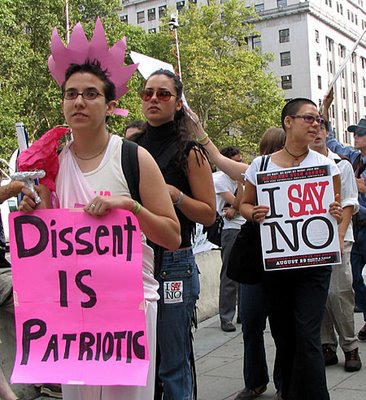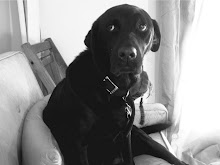Sunday, July 16, 2006
nine one one.
Have you watched this? Interesting perspective on 9/11. I've heard that this will be released in theaters as well, but the video is free to watch here, and it's streaming, so you don't have to wait for it to download.
my humps.
my humps. my humps, my humps, my humps. my lovely lady lumps. in the back and in the front. my humps.

Friday night, I was having a drink at a bar with my friend Elizabeth and my husband, Bruce. We were listening to a karaoke version of "my humps," and we were probably the most sober people within at least a few yards. Above the bar was a television showing videos of Israel's attack on the Beirut International Airport. We all acknowledged the dichotomy of the situation, and had a short discussion on some of life's more political questions. Some of these questions, I have grappled with for years. I can remember being a child and learning about the Holocaust; I remember casting judgement upon every human living at the time, who chose to do nothing...who did not research their intuitions, their fears...who were disconnected as families and individuals were exploited for labor and slowly murdered...How could it happen???
Later, I began reading Elie Wiesel, a Holocaust survivor who is famous for many things, including his words on indifference.
so, I ask myself...
What are the responsibilities of a citizen (of a state/nation/world)?
Where is the line between indifference and a clean conscience?
In other words, am I doing enough?
Is it enough to simply vote your conscience...
or should we be doing more?
Is it enough to show up at a protest,
or should we be doing more?
I think of all of the terrible things...
Darfur...human exploitation...Iraq...economic exploitation
I know that if these situations were right in front of me,
I would feel so differently. If someone were dying in front of
us, wouldn't we do all that we could to save them?
When can we say we have done enough?
I tend to think that most answers to these questions are rationalizations, and that the true answers were held by people like:
Jesus,
Mother Theresa,
Gandhi,
and Dorothy Day...
Are conviction and conscience relative? Was Mother Theresa's calling hers alone...or one that most of us simply ignore?
...I know one thing: Dissent is the highest form of patriotism. Being "non-political" may be a comforting thought; however it is my belief that citizenship should be taken seriously...not doing so gives up your power, which can (and has!) been used to exploit, to steal, to kill. The concepts behind America are pretty fantastic--I've included an excerpt from the Declaration of Independence here:
On April 4, 1967, in the midst of the Vietnam War, Martin Luther King spoke at Riverside Church in New York City on the subject "Beyond Vietnam—A Time to Break Silence." Note the similarities between Iraq and Vietnam. A question I'm asking myself is, "are we doing enough?" It seems that people generally agree that the dissent involved in this unjust war is not as powerful as the dissent found in Vietnam. I wonder, what is the difference? Are we more disconnected? More busy? Are we afraid to think about it? Is it just too hard? This is only an excerpt of his speech; if you want the full text and cannot find it online, email me and I'll pass it along. :)


Friday night, I was having a drink at a bar with my friend Elizabeth and my husband, Bruce. We were listening to a karaoke version of "my humps," and we were probably the most sober people within at least a few yards. Above the bar was a television showing videos of Israel's attack on the Beirut International Airport. We all acknowledged the dichotomy of the situation, and had a short discussion on some of life's more political questions. Some of these questions, I have grappled with for years. I can remember being a child and learning about the Holocaust; I remember casting judgement upon every human living at the time, who chose to do nothing...who did not research their intuitions, their fears...who were disconnected as families and individuals were exploited for labor and slowly murdered...How could it happen???
Later, I began reading Elie Wiesel, a Holocaust survivor who is famous for many things, including his words on indifference.
The opposite of love is not hate, it's indifference.
The opposite of art is not ugliness, it's indifference.
The opposite of faith is not heresy, it's indifference.
And the opposite of life is not death, it's indifference.
so, I ask myself...
What are the responsibilities of a citizen (of a state/nation/world)?
Where is the line between indifference and a clean conscience?
In other words, am I doing enough?
Is it enough to simply vote your conscience...
or should we be doing more?
Is it enough to show up at a protest,
or should we be doing more?
I think of all of the terrible things...
Darfur...human exploitation...Iraq...economic exploitation
I know that if these situations were right in front of me,
I would feel so differently. If someone were dying in front of
us, wouldn't we do all that we could to save them?
When can we say we have done enough?
I tend to think that most answers to these questions are rationalizations, and that the true answers were held by people like:
Jesus,
Mother Theresa,
Gandhi,
and Dorothy Day...
Are conviction and conscience relative? Was Mother Theresa's calling hers alone...or one that most of us simply ignore?
...I know one thing: Dissent is the highest form of patriotism. Being "non-political" may be a comforting thought; however it is my belief that citizenship should be taken seriously...not doing so gives up your power, which can (and has!) been used to exploit, to steal, to kill. The concepts behind America are pretty fantastic--I've included an excerpt from the Declaration of Independence here:
We hold these truths to be self-evident, that all men are created equal, that they are endowed by their Creator with certain unalienable Rights, that among these are Life, Liberty and the pursuit of Happiness. — That to secure these rights, Governments are instituted among Men, deriving their just powers from the consent of the governed, — That whenever any Form of Government becomes destructive of these ends, it is the Right of the People to alter or to abolish it, and to institute new Government, laying its foundation on such principles and organizing its powers in such form, as to them shall seem most likely to effect their Safety and Happiness. Prudence, indeed, will dictate that Governments long established should not be changed for light and transient causes; and accordingly all experience hath shewn that mankind are more disposed to suffer, while evils are sufferable than to right themselves by abolishing the forms to which they are accustomed. But when a long train of abuses and usurpations, pursuing invariably the same Object evinces a design to reduce them under absolute Despotism, it is their right, it is their duty, to throw off such Government, and to provide new Guards for their future security.
What Would Martin Luther King Do?
On April 4, 1967, in the midst of the Vietnam War, Martin Luther King spoke at Riverside Church in New York City on the subject "Beyond Vietnam—A Time to Break Silence." Note the similarities between Iraq and Vietnam. A question I'm asking myself is, "are we doing enough?" It seems that people generally agree that the dissent involved in this unjust war is not as powerful as the dissent found in Vietnam. I wonder, what is the difference? Are we more disconnected? More busy? Are we afraid to think about it? Is it just too hard? This is only an excerpt of his speech; if you want the full text and cannot find it online, email me and I'll pass it along. :)

In 1957 when a group of us formed the Southern Christian Leadership Conference, we chose as our motto: "To save the soul of America." We were convinced that we could not limit our vision to certain rights for black people, but instead affirmed the conviction that America would never be free or saved from itself until the descendants of its slaves were loosed completely from the shackles they still wear. In a way we were agreeing with Langston Hughes, that black bard of Harlem, who had written earlier:
O, yes,
I say it plain,
America never was America to me,
And yet I swear this oath —
America will be!
Now, it should be incandescently clear that no one who has any concern for the integrity and life of America today can ignore the present war. If America's soul becomes totally poisoned, part of the autopsy must read: Vietnam Iraq. It can never be saved so long as it destroys the deepest hopes of men the world over. So it is that those of us who are yet determined that America will be are led down the path of protest and dissent, working for the health of our land.…
What must they be thinking when they know that we are aware of their control of major sections of Vietnam Iraq, and yet we appear ready to allow national elections in which this highly organized political parallel government many Iraqis, including the entire Sunni population, will not have a part?… Is our nation planning to build on political myth again, and then shore it up upon the power of new violence?
Here is the true meaning and value of compassion and nonviolence, when it helps us to see the enemy's point of view, to hear his questions, to know his assessment of ourselves. For from his view we may indeed see the basic weaknesses of our own condition, and if we are mature, we may learn and grow and profit from the wisdom of the brothers who are called the opposition.…
At this point I should make it clear that while I have tried in these last few minutes to give a voice to the voiceless in Vietnam Iraq and to understand the arguments of those who are called "enemy," I am as deeply concerned about our own troops there as anything else. For it occurs to me that what we are submitting them to in Vietnam Iraq is not simply the brutalizing process that goes on in any war where armies face each other and seek to destroy. We are adding cynicism to the process of death, for they must know after a short period there that none of the things we claim to be fighting for are really involved. Before long they must know that their government has sent them into a struggle among Vietnamese Iraqis, and the more sophisticated surely realize that we are on the side of the wealthy, and the secure, while we create a hell for the poor.
Somehow this madness must cease. We must stop now. I speak as a child of God and brother to the suffering poor of Vietnam Iraq. I speak for those whose land is being laid waste, whose homes are being destroyed, whose culture is being subverted. I speak for the poor of America who are paying the double price of smashed hopes at home, and death and corruption in Vietnam Iraq. I speak as a citizen of the world, for the world as it stands aghast at the path we have taken. I speak as one who loves America, to the leaders of our own nation: The great initiative in this war is ours; the initiative to stop it must be ours.…
A true revolution of values will soon cause us to question the fairness and justice of many of our past and present policies. On the one hand, we are called to play the Good Samaritan on life's roadside, but that will be only an initial act. One day we must come to see that the whole Jericho Road must be transformed so that men and women will not be constantly beaten and robbed as they make their journey on life's highway. True compassion is more than flinging a coin to a beggar. It comes to see that an edifice which produces beggars needs restructuring.
A true revolution of values will soon look uneasily on the glaring contrast of poverty and wealth. With righteous indignation, it will look across the seas and see individual capitalists of the West investing huge sums of money in Asia, Africa, and South America, only to take the profits out with no concern for the social betterment of the countries, and say, "This is not just." It will look at our alliance with the landed gentry of South America and say, "This is not just." The Western arrogance of feeling that it has everything to teach others and nothing to learn from them is not just.
A true revolution of values will lay hand on the world order and say of war, "This way of settling differences is not just." This business of burning torturing human beings with napalm, of filling our nation's homes with orphans and widows, of injecting poisonous drugs of hate into the veins of peoples normally humane, of sending men home from dark and bloody battlefields physically handicapped and psychologically deranged, cannot be reconciled with wisdom, justice, and love. A nation that continues year after year to spend more money on military defense than on programs of social uplift is approaching spiritual death.
America, the richest and most powerful nation in the world, can well lead the way in this revolution of values. There is nothing except a tragic death wish to prevent us from reordering our priorities so that the pursuit of peace will take precedence over the pursuit of war. There is nothing to keep us from molding a recalcitrant status quo with bruised hands until we have fashioned it into a brotherhood.
Subscribe to:
Comments (Atom)




